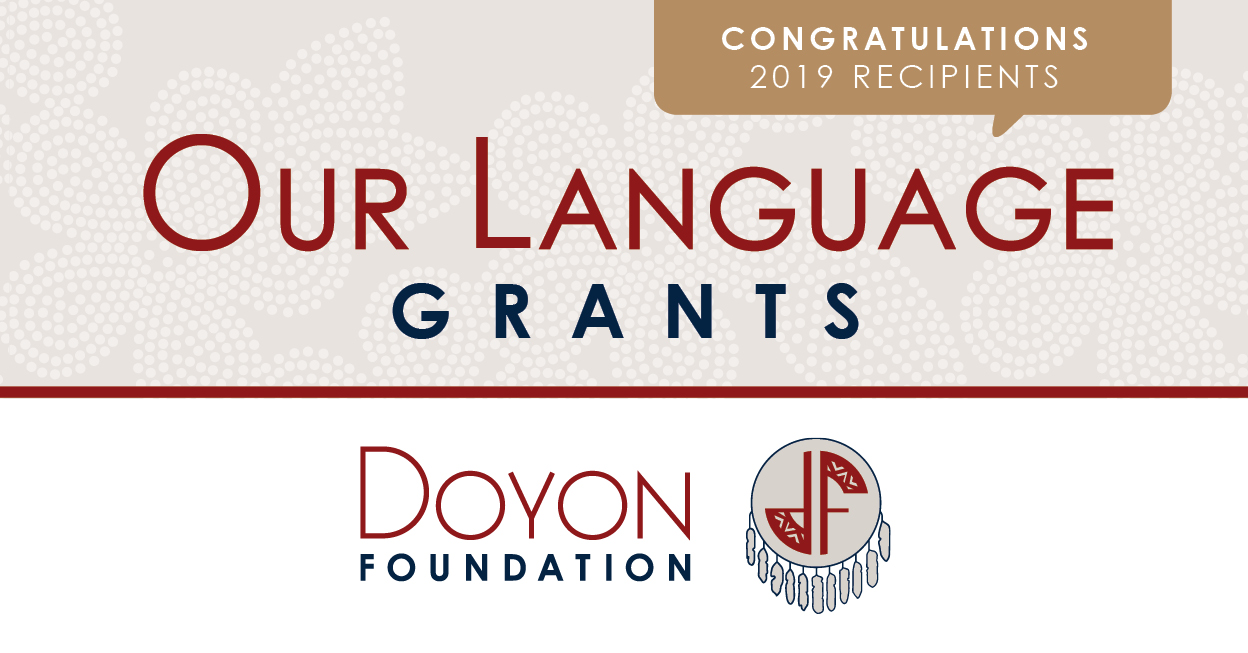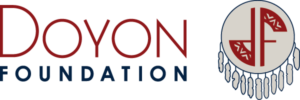Doyon Foundation awards $50,000 for language revitalization projects

Doyon Foundation is pleased to announce the 2019 recipients of the Our Language grant awards. This year, the Foundation is awarding a total of $50,000 to nine organizations to support community-based language revitalization projects.
“The 2019 Our Language grant awardees represent a dedicated group of community members coming together on behalf of our ancestral languages. We commend their efforts, and look forward to great outcomes from each of these projects,” says Doris Miller, executive director of Doyon Foundation.
The 10 ancestral languages of the Doyon region are all severely to critically endangered, and will be lost within the span of a few generations if no action is taken. To address this crisis, Doyon, Limited established the language grant program in 2012, and the Doyon Foundation language revitalization program now manages it.
“Each year the situation for our languages grows more urgent, and the call to action ever louder and clearer. Doyon Foundation is proud to support our communities and their efforts to learn and teach the languages passed down to us from our grandparents,” says Allan Hayton, the Foundation’s language revitalization program director.
This year’s grant awards are even more significant, as 2019 is the International Year of Indigenous Languages, as recognized by the United Nations. “Languages play a crucial role in our daily lives. They are not only our first medium for communication, education and social integration, but are also at the heart of each person’s unique identity, cultural history and memory,” states the UN website.
“Each of the languages in the Doyon region deserve our daily recognition in 2019, and every year,” Hayton urges. “Get involved, learn, teach, speak your language each and every day.”
The 2019 Our Language grant recipients include:
Athabascan Fiddlers Association. KRFF 89.1 Voice Of Denali broadcasts across the Doyon region, with listeners regularly calling in to contribute to the “Native Word of the Day” and “Phrase of the Day” in the many languages across the region. KRFF’s Our Language grant project involves isolating, cataloging and archiving digital copies of these words and phrases for use in current and future revitalization efforts throughout Interior Alaska. The files will be accessible to learners on the KRFF website.
Council of Athabascan Tribal Governments. A project entitled “Gwich’in Language Learning & Material Creation Around Salmon Fishing” will create language-learning opportunities and materials centered around traditional Gwich’in subsistence activities. The project is scheduled to take place in summer 2019, during the Yukon River king salmon runs in late June and early July. Lessons will be centered around the smokehouse along the Yukon River within the village.
Fairbanks Native Association. The Denaakk’e Hʉdełnekkaa are a parent group for students enrolled in the Denaakk’e Head Start program, which is currently in its second year with 15 3 to 5-year-olds enrolled. The goal of the Denaakk’e Hʉdełnekkaa parent group is to support one another, and in turn support the children and teachers in learning and speaking the Denaakk’e language. This project will engage in learning games and activities, work with Elders, meet regularly to learn Denaakk’e, and maintain an open invitation to others interested in learning Denaakk’e.
Koyukuk Tribal Council. This project will create and organize a Denaakk’e language revitalization program, with a mission “to sustain our cultural heritage, traditional lifestyle and healthy environment for future generations.” The project will engage in community language planning, teaching and storytelling through the use of video, posting local place and building names in Denaakk’e language, and fostering a learning environment within the community.
Organized Village of Grayling. This project will involve an 11-week course with 51 students, drawing from lessons created with knowledgeable Elders. Coordinators will create basic word and phrase lists, develop lesson plans, and arrange classes with the goal of all participants mastering basic conversational skills in Holikachuk language. Older students will assist in the recording of lessons, as well as help with teaching younger students.
Native Village of Minto. Tr’ukheyiyh, “We are talking,” is a one-year pilot project that will utilize real-world immersion and online tools to provide language learners of all levels easier access and greater retention by providing a foundation to start, continue or contribute to community language revitalization efforts. The project will draw from new and existing content for Benthi Kokhut’ana Kenaga’, and plans to utilize in-person lesson instruction, summer cultural camp immersion, and recorded lessons shared via YouTube.
Nulato Tribal Council. This project will work to translate the 1983 Central Koyukon workbook into the Lower Koyukon language. There will also be an accompanying video of translations, which will be posted online for learners. All Nulato and Kaltag tribal members will have access via www.nulatotribe.net.
Tanana Tribal Council. The Tanana Cooperative Community Language Preservation and Revitalization Project will continue to create interactive video lessons to teach common phases and conversations by Elders who speak Denaakk’e as used in Tanana, and share materials both in cultural camps and in classrooms.
Tetlin Village Council. This project will focus on promoting the Tetlin dialect of the Nee’aanèegn’ (Upper Tanana) language through two sessions at Tetlin Culture Days. The sessions support the Tetlin Community Plan priority to “promote language preservation by proactively encouraging cultural activities that bring the community together.” Participants will be provided with copies of the Upper Tanana alphabet, as well as books and CDs from Elders Roy and Cora David.
Last year, the Foundation awarded nine grants totaling $64,000 to support projects including professional development, radio broadcasts, teacher training, audio and video lesson development, language immersion activities, culture camps, and lesson plan development. Read more about the 2018 grant projects on our blog.
For more information on the language revitalization program or Our Language grants, please visit www.doyonfoundation.com or contact the language revitalization program at foundation@doyon.com or 907.459.2048
The Indigenous languages of the Doyon region:
- Benhti Kokhut’ana Kenaga’ (Lower Tanana)
- Deg Xinag
- Denaakk’e (Koyukon)
- Dihthaad Xt’een Iin Aanděeg’ (Tanacross)
- Dinak’i (Upper Kuskokwim)
- Dinjii Zhuh K’yaa (Gwich’in)
- Hän
- Holikachuk
- Inupiaq
- Nee’aanèegn’ (Upper Tanana)
